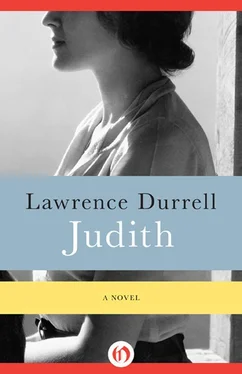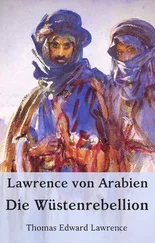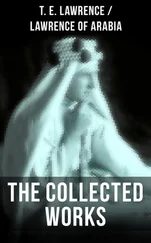A note of vexation came into his voice.
“What do you see in store for us now?” he said. “You might as well give me the benefit of a parting word, eh?”
Lawton accepted a cigar from the inlaid sandalwood box.
“Well,” he said, “since my responsibility’s over, I suppose I can indulge in a bit of fortune telling. That’s about all it would be.”
“This time I’ll pay careful heed,” said H.E. “What do you predict?”
Lawton considered for a second and then said:
“Within three weeks, at the outside, we’ll all be pulled out of here to leave a vacuum into which eight Arab armies are going to get sucked.”
“And then?”
“War,” said Lawton laconically. “What I can’t tell you is whether the Jews or the Israelis, as they’re now called, can defend themselves. That will have to be seen. But none of us will be here to see it, unfortunately.”
H.E. got up and walked up and down the terrace slowly and ponderously, reflecting. His elegant and discontented face with its handsome head of grey hair was still part-turned towards Jerusalem. At this moment the ADC appeared in the lighted patch by the great French windows and said:
“Forgive me, Sir, London is on the wire. It’s the personal line. Secretary of State’s office.” Lawton finished his drink and rose.
“The Secretary of State?” said H.E. on a rising note.
The two men exchanged a quizzical and ironic glance.
“That’s probably our marching orders,” said H.E.
Extending his hand, he shook hands with unaccustomed warmth and added with unexpected generosity: “Good luck, Major. I wish we’d made better use of your brains.”
The words echoed pleasurably in Lawton’s mind as the duty car jogged him back to Jerusalem. Well, even a bloody fool can be a gentleman, he thought, and that was something. His thoughts reverted to Grete as he had last seen her, standing with an air of white-faced uncertainty while the little priest smiled at her from the sitting-room door of the flat. Perhaps this was the best way. After all, there was nothing left to say to her. He would leave without a word. It was idle to continue tormenting himself on her behalf, and of tantalizing himself by seeing her.
He climbed stiffly out of the car at the gate of his private villa and walked slowly up the path to the front door. Jenkins, his batman, had the evening off, so he was forced to use a latch key. The little villa smelled musty and his bedroom was full of mosquitoes. He hauled a couple of dusty suitcases out of the wardrobe and began to pack his few belongings. This did not take him long. Then he went to the telephone and asked the duty operator at the office to call him at four.
“I have a six o’clock flight from Lydda,” he explained.
Then he stood for a moment, irresolutely looking at the carpet and wondering whether he was tired enough to go to bed there and then.
Suddenly the phone rang. It was Grete. But her voice sounded changed. It had a queer note in it — he frowned as he tried to identify it. Was he wrong, or was there a suggestion of exultation, of relief, almost of triumph?
“What is it?” he said anxiously. “You sound so different.”
“I wanted to ask you if you were doing anything tonight,” she said. “I simply must go out. I can’t sit at home for the rest of the evening. Are you free?”
“Yes,” he said.
In fact, he cursed himself for his lack of resolution. He could easily have made some excuse; and then by morning he would have gone and a whole new cycle would have started. He was beginning to realize that, while he loved Grete, something in him also wanted to be rid of this encumbering, futile, rather sterile emotion which was doomed for lack of a response in her.
“By the way,” he said. “I’m off in the morning very early.”
The expression of her dismay seemed very pleasurable to him. “So soon?” she said in a hollow tone.
“I’ve been expecting it,” he replied. “We both have.”
“India is so far away,” she said.
He ignored the remark and said simply, “Where do we meet, and when?”
“Are you sure you’re not too tired?”
“Sure.”
“Then the Officers’ Club, in half an hour.”
He crossed the town on foot, noticing the tremendous animation mixed with uncertainty which pervaded everything. The fireworks still went on, and at the Officers’ Club they reflected themselves in the lily pond beside which the diners and dancers sat at tables glittering with white napery and shaded lamps. The grass was soft and green.
She was sitting in a corner at a table on the lawn, waiting for him. The rosy cone of light shed by the table lamp with its red shade set off her shining eyes and hair. What surprised him most was the expression of calm on her face — a strange new relaxed expression of maturity which he had not seen before, and which he diagnosed as being relief after strain. It was in his mind to ask her what news, if any, she had received from her visitor earlier in the evening, but a native shyness made him hesitate and smile instead at her in a tongue-tied fashion.
“Hello,” he said simply, awkwardly.
“Hello,” she replied.
A momentary awkwardness sprang up between them. It was as if all the contingencies of the world which were about to separate them had, in some way, made them strangers to each other. Perhaps it was to shake off his depression that she reached forward and put her hand on his. She felt how deeply the warmth of her touch affected him.
“I must tell you my news,” she said, “since you’re too tactful to ask about it.”
“It was not tact,” he said. “I was afraid for you. Did the priest have anything useful to say?”
“He told me everything I wanted to know,” she said. “Coming all in a lump like that, it roared through me like a north wind, knocked me sideways a bit. Otto is dead, for example. I keep repeating the phrase aloud to myself, astonished to find it means nothing. Or if it does mean something, I haven’t grasped what it can be. And yet, I’m not dazed… I’m perfectly calm. It puzzles me terribly. I don’t know whether to accuse myself of callousness, or what.”
In the long silence that followed, he looked at her keenly, intently.
“I am dreadfully anxious for you,” he said at last. “This country is going to blow up. I wish you had let me take you away before the balloon goes up, as it must. My poor Grete,” he added under his breath.
She was silent and he knew why. The shadow of David rose between them. Then he said:
“Why don’t you go back to Ras Shamir?”
“I’ve asked myself that question,” she said, “more than once. I wanted to and yet something held me back. Perhaps that something was the mystery of my husband and… you know. Now my way seems much clearer. Yet suddenly I feel as if I’d lost the impulse to long very deeply for anything anymore. I wonder if you see.”
He pressed her hand sympathetically and nodded.
“Come,” he said, “let’s not spoil our last evening with gloomy questions. Everything will resolve itself sooner or later. Shall we dance?”
They moved softly and lightly into the throng of fox-trotting officers and their womenfolk. Donaldson of the Hussars showed some disposition to cut in, but Lawton pleaded with him successfully, saying that he was leaving in the morning and the young man acceded to his request with a lordly and slightly tipsy air.
“Have you heard the news?” he said. “We’re packing up. Marching orders came in this evening. Now it’ll be dog-eat-dog, or rather, Arab-eat-Jew.”
“It might be Jew-eat-Arab,” said Lawton under his breath as they circled the dance floor and then left it to continue their slow revolutions on the green grass by the swimming pool. He had never seen her looking so radiant, nor found her so tender, so accommodating. Dancing cheek to cheek, as they were, one might pardonably have mistaken her for a lover or his wife. The subaltern at the bar looked openly envious and Donaldson expressed his own view of the matter by ordering another Scotch whisky and toasting the distant Lawton, muttering, “Here’s to a lucky dog,” as he raised his glass.
Читать дальше












